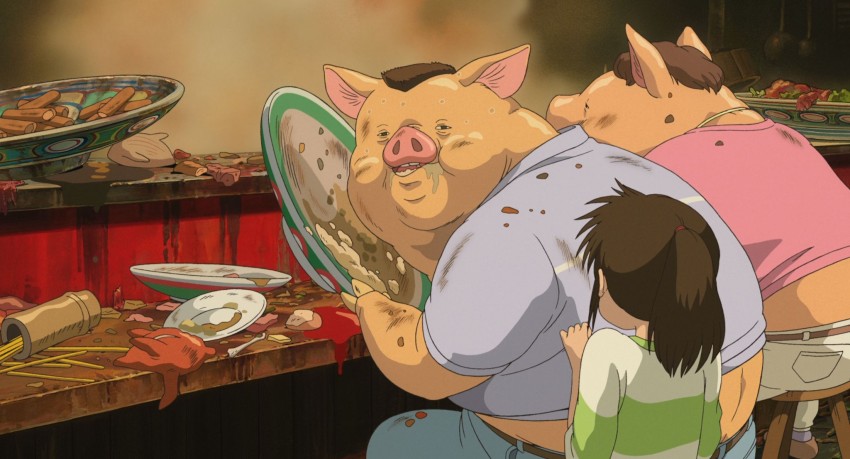Books: Miyazaki’s Morals
July 16, 2017 · 0 comments
By Raz Greenberg.
 Eric Reinders’ The Moral Narratives of Hayao Miyazaki often feels uncomfortably detached from the director’s position in the world of anime. Instead, it places these works in another context, one with which religious scholar Reinders is more at home. Devoting a chapter to each of Miyazaki’s films, from Nausicaa to The Wind Rises, Reinders examines their religious aspects from a wide variety of perspectives – the presence of Shinto symbolism, Buddhist philosophy, Christian iconography, Greek myths and even elements from the writings of JRR Tolkien.
Eric Reinders’ The Moral Narratives of Hayao Miyazaki often feels uncomfortably detached from the director’s position in the world of anime. Instead, it places these works in another context, one with which religious scholar Reinders is more at home. Devoting a chapter to each of Miyazaki’s films, from Nausicaa to The Wind Rises, Reinders examines their religious aspects from a wide variety of perspectives – the presence of Shinto symbolism, Buddhist philosophy, Christian iconography, Greek myths and even elements from the writings of JRR Tolkien.
It reminded me of a lecture I heard many years ago by Emanuel Lottem, one of the leading Hebrew translators of science fiction and fantasy literature. In discussing a new Hebrew edition of Lord of the Rings, Lottem commented on the difficulties a translator would face if translating Tolkien’s work with no knowledge of his sources of inspiration, a task compared to “trying to translate The Odyssey without knowing anything about Greek Mythology.” Yes, it’s possible, but the result would surely be lacking.
 Reinders’ book gave me flashbacks to that lecture, not just because of the frequent references he makes to Tolkien in order to comment on Miyazaki, but also because, while trying to interpret rather than translate the meaning behind Miyazaki’s films, he seems to insist on ignoring the immediate context in which Miyazaki made them. The word “anime” barely appears, references to anime works not made by Miyazaki are practically non-existent, and at one point Reinders dismisses Miyazaki’s early career as unworthy of attention, including his first film, The Castle of Cagliostro, which he considers to be merely “…a long episode of a television series.” The statement made me wonder – has he seen Miyazaki-directed (or, more importantly, non-Miyazaki-directed) episodes of Lupin III? Even when analyzing Nausicaa of the Valley of the Wind and Castle in the Sky, Reinders seems embarrassed by their “fairly conventional storytelling” which appears to him to be rooted in them being tales of action and adventure. He does not seem to notice that, even then, Miyazaki was adding his own twists to well-established genres. The same is true for My Neighbour Totoro, which Reinders thinks was the first film to demonstrate that Miyazaki is “a great director.”
Reinders’ book gave me flashbacks to that lecture, not just because of the frequent references he makes to Tolkien in order to comment on Miyazaki, but also because, while trying to interpret rather than translate the meaning behind Miyazaki’s films, he seems to insist on ignoring the immediate context in which Miyazaki made them. The word “anime” barely appears, references to anime works not made by Miyazaki are practically non-existent, and at one point Reinders dismisses Miyazaki’s early career as unworthy of attention, including his first film, The Castle of Cagliostro, which he considers to be merely “…a long episode of a television series.” The statement made me wonder – has he seen Miyazaki-directed (or, more importantly, non-Miyazaki-directed) episodes of Lupin III? Even when analyzing Nausicaa of the Valley of the Wind and Castle in the Sky, Reinders seems embarrassed by their “fairly conventional storytelling” which appears to him to be rooted in them being tales of action and adventure. He does not seem to notice that, even then, Miyazaki was adding his own twists to well-established genres. The same is true for My Neighbour Totoro, which Reinders thinks was the first film to demonstrate that Miyazaki is “a great director.”
In an English-speaking publishing world where you can still count single-director biographies on the fingers of one hand, the field of religious anime books is already oddly crowded. There’s Japanese Mythology in Film, for example, and Miyazaki’s Animism Abroad, and that’s just among the titles we have reviewed on this blog. Reinders has some interesting points to make, such as the color-coding in Nausicaa or the significance of the shrines seen at the bus-stop scene in Totoro. He augments this with a strong sense of continuity – for example, the analysis of the shrines in Totoro is later contrasted with similar imagery in Spirited Away. Drawing from a wide variety of sources about different beliefs, mythologies and tales, Reinders manages to nail major themes in Miyazaki’s films, while praising the director’s avoidance of dichotomies like good versus evil or happiness versus tragedy. It works better in chapters examining films with obvious religious undertones such as Totoro or Princess Mononoke, not so much in films with fewer such references like Kiki’s Delivery Service or Howl’s Moving Castle. But even then, Reinders provides a thought-provoking analysis. It all comes together in the final chapter, where he summarises his conclusions on the moral themes within Miyazaki’s filmography. While these conclusions are open for debate, they are well presented and persuasive.
Unfortunately, this final chapter is followed by a truly weird appendix titled “Continuing the Stories” in which Reinders attempts to decipher the formula behind Miyazaki’s storytelling. Having very little to do with the rest of the book, there is absolutely nothing thought-provoking about this appendix, which reads more like a guide for writing bad fan-fiction. It’s something that wiser editors should have really insisted on discarding.
In the end, the experience that Reinders offers his readers is uneven – his analysis of Miyazaki’s films makes many good points, but his insistence on distancing himself discussing these films as anime gives the impression that something is missing. Coupled with some frankly odd observations (I raised an eyebrow when Reinders described the theme of Kiki as “work sucks”), an overtly-conversational tone, too many exclamations and a surfeit of anecdotes from the author’s personal experience, along with the terrible “Stories” appendix – it all detracts from the book’s impact and readability. But Miyazaki fans and scholars who are willing to dig into it will find a satisfying commentary on their favorite director.
The Moral Narratives of Hayao Miyazaki, by Eric Reinders, is available now from McFarland.
books, Eric Reinders, Hayao Miyazaki, Kiki's Delivery Service, My Neighbour Totoro, religion, Spirited Away, Studio Ghibli
Leave a Reply